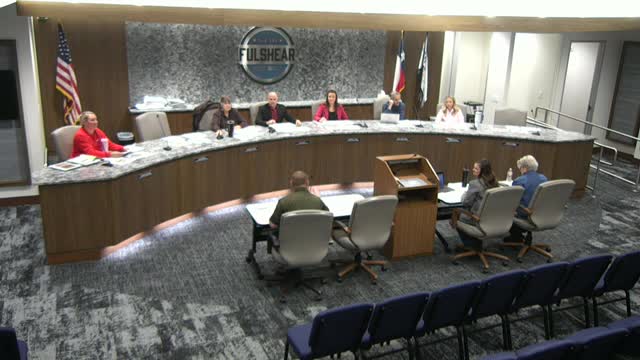Fulshear parks commissioners briefed on Texas election-code limits for bond communications
Get AI-powered insights, summaries, and transcripts
Subscribe
Summary
Legal counsel explained Texas Election Code §255.003 and ethics opinions that limit use of public resources for political advertising, advising commissioners how to stay within informational bounds before the May bond election.
Legal counsel briefed the Fulshear Parks and Recreation Commission on Feb. 14 about what commissioners may and may not say or do publicly now that the city has called a bond election scheduled for May 3.
Byron (city staff/attorney) told the commission that the relevant provision is in the Elections Code and cited “255.003 of the elections code, which is titled unlawful use of public funds for political advertising.” He summarized how the statute and ethics opinions have been interpreted by the Texas Ethics Commission and local counsel: public funds or resources may not be used to publish political advertising supporting or opposing a measure, and “use of public funds” extends beyond checks or credit cards to include personnel time, copy machines, toner, electricity and other city resources.
Byron said informational, factual communications about what a bond would fund and project timelines are generally permissible if they are not advocating for or against the measure. He noted the “eye of the beholder” in separating factual information from advocacy and advised commissioners to avoid acting in ways that would suggest they are speaking for the city when they intend to speak as private citizens. Byron also explained that pre-clearance from the ethics commission or an attorney general opinion can provide an affirmative defense if a communication later is challenged.
Commissioners asked specific questions about social media administration, sharing posts, and whether approving a post on an official page would be considered public advertising. Byron replied that if a post is approved in an official capacity or appears on an official page, it likely would be treated as use of public funds. He advised commissioners that when speaking personally—“standing in our driveway” or at a public meeting as a resident—individuals retain First Amendment rights, but should avoid using titles or language suggesting they represent the commission.
Why this matters: the commission is composed of volunteers whose duties are authorized by city officers and employees, and counsel said those volunteers should be cautious because ethics opinions have applied the prohibition broadly to public resources and personnel time.
Commission guidance recorded in the meeting: staff will continue to present project updates framed as factual, agenda-based information; the commission agreed it would be advisable to remove standalone bond updates from future agendas and instead include strictly project-related updates to avoid any perception of advocacy.
Byron encouraged commissioners to request pre-clearance for any proposed public communications that might be reproduced or distributed using city resources.
